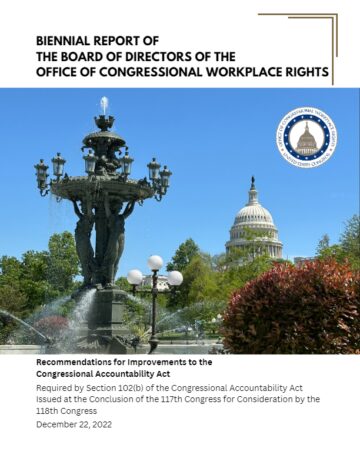The Office of Congressional Workplace Rights (OCWR) Board submits this report to Congress per section 102(b) of the Congressional Accountability Act (CAA). In accordance with the CAA, the Board is to provide each Congress with recommendations regarding the applicability to the legislative branch of Federal workplace rights, safety and health, and public access laws and regulations. The Board’s fulfillment of this requirement provides Congress with information and recommendations necessary to ensure that the rights and protections applied to the legislative branch are equal to those applied to the executive branch and to the private sector.
In this report, the Board addresses and recommends changes to the CAA’s substantive protections and obligations, and to the necessary implementing procedures and regulations. Adoption of these recommendations would ensure Congress meets the goal it set for itself: to apply to the legislative branch those workplace rights and obligations that it has applied to the executive branch and the private sector.
Improving Protections and Obligations to Create Parity with the Executive Branch and the Private Sector
- Require employing offices to maintain records of workplace injuries and illnesses to identify and prevent workplace hazards.
- Protect from retaliation employees who make whistleblower disclosures to authorized officials.
- Protect from retaliation non-employees with disabilities who pursue claims under the CAA’s public accessibility provisions.
- Protect employees who serve on jury duty, declare bankruptcy, or have their wages garnished.
- Extend paid child bereavement leave to legislative branch employees.
Improving Implementation of Existing Rights
- Require employing offices to maintain personnel records under the CAA.
- Empower the OCWR General Counsel to seek a court order to enjoin temporarily unfair labor practices.
- Provide transparency by allowing disclosure oflabor-management proceedings and of proceedings regarding disability-related public access.
- Approve pending regulations, including those related to overtime pay, paid parental leave, the right to collective bargaining throughout the legislative branch, service members and their families, and public access to facilities.

